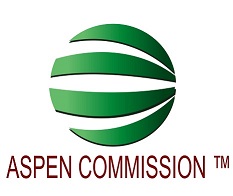ASPEN COMMISSION ™
THE CENTER FOR PHILOSOPHY POLITICS SPIRITUALITY AND SCIENCE ™
America’s prosperity, which underwrites our national security, depends on maintaining a fair, open, and stable international economy that guarantees reliable access to affordable energy for the United States and our allies, and well-governed trading partners. As the United States is an increasingly dominant energy producer, the Department of State and USAID have the opportunity to forge a market-based international energy policy that strengthens the energy security of the U.S. and our allies. Maintaining market access for U.S. energy products, technologies and services, and ensuring sustainable, transparent, and predictable international energy markets for our partners and ourselves is crucial to our security. However, lack of access to energy creates conditions for political instability, migration, and the proliferation of extremist organizations. Non-competitive behavior, such as monopolies, sole suppliers, and cartels that use energy as a political and economic weapon threaten global energy security. We also work to deny terrorists and rogue nations access to funds derived from energy production. These are threats not only to the economic and national security of American allies and partners, but also of the United States itself. Transparency shines a light on corruption and makes foreign publics more invested in their governments, while also protecting American citizens and companies operating abroad. The United States has long played an international leadership role promoting the adoption of international best practices in order to perpetuate the rules-based economic system upon which our prosperity is predicated, and to help ensure a free and fair arena where U.S. companies can compete. Strategies for Achieving the Objective To advance the President’s National Security Strategy and the America First Energy Plan, the Department promotes energy security for the United States, our partners and allies by promoting diverse global energy supplies from all energy sources. The Department of State works to defeat ISIS and other transnational terrorist organizations by preventing the groups’ ability to exploit energy resources they control. The Department works to open markets and remove barriers to energy trade and development while promoting U.S. energy exports globally, including U.S. liquefied natural gas (LNG). The Department and USAID coordinate with governments and companies to pursue energy diversification and increased access to affordable and reliable energy (particularly to electric power) and to develop efficient and sustainable energy policies abroad through technical assistance and public-private partnerships. We work through the global Extractive Industries Transparency Initiative (EITI) to promote transparency abroad, improve energy resource governance, and reduce corruption. The Department and USAID work with partner countries to promote a culture of integrity to prevent corruption before it starts and to strengthen detection and enforcement efforts. This includes encouraging countries to meet multilateral standards and political commitments. We work with partners to develop and implement international standards to combat the bribery of foreign officials, based on the Organization for Economic Cooperation and Development (OECD) Anti-Bribery Convention. The Department and USAID focus on recovering the ill-gotten lucre of corruption by working bilaterally and multilaterally to strengthen the capacity of foreign governments to investigate and prosecute public and private sector corruption. We provide a comprehensive range of assistance to help countries in developing and sustaining an array of governmental reforms that contribute to fighting corruption. The Department manages the Global Anti-Corruption Consortium in partnership with USAID and partner governments. The Department’s comprehensive anti-corruption programs build the capacity of foreign law enforcement to combat corruption, including kleptocracy, and strengthen international standards and political will to implement needed reforms. The Department and USAID promote a wide array of policy and legislative reforms to remove barriers to doing business, encourage transparency, promote fiscal responsibility, and protect investor and intellectual property rights. Two important vehicles for convening partners are the G7 and G20 summits, which bring together member countries to enhance government transparency and accountability. The Department leads U.S. participation in bilateral and multilateral energy task forces that recommend solutions to energy problems affecting our partners around the world. The agencies work through bilateral and multilateral engagement, and regional initiatives such as Power Africa and Connecting the Americas 2022 to expand electrical interconnections.
|

World Markets
-- Teddy Roosevelt, 26th President of the United States of America
Aspen Commission ™ All Rights Reserved 1996-2025
IBS INTERNATIONAL BOARD OF STANDARDS
Aspen Commission Academy of International Relations, Philosphy Politics and Innovation - International Political Foregin Relations Public Policy Council. The Aspen Commission ™ is an Association Registered in Colorado and is also a listed as an Limited Company CO USA.
CEO Commission Join Mission Ethics Home Continuing Ed Government Jobs Awards Degrees Certification newspapers Diplomacy markets Links Careers Disclaimer
Accreditation and Recognition: GAFM * www.GAFM.org * www.CertifiedProjectManager.eu * www.AAFM.org * Certified Project Manager * Certified e-Commerce Consultant * Royal Law Society * Royal Business Society * Royal Business College * Royal Fellows * Royal Economics Academy * Oxford Law School * AAFM * Certified International Project Manager * www.GMentz.com * www.CertifiedProjectManager.org * www.GeorgeMentz.com * www.AAFM.us * www.icecc.com * www.reclaimingspirituality.com *